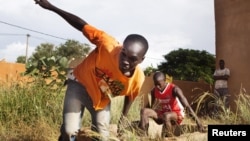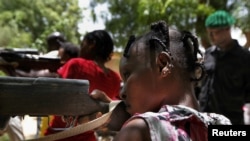SEVARE, MALI —
Northern Malian self-defense militias are uniting and training young men and women how to fight, as they prepare for a future offensive to the North. The militias reflect a growing impatience among Malians to retake the territory from al-Qaida-linked Islamist militants who seized control in April.
Leaders of the new generation of the Ganda Koy revived their militia in April, shortly after armed Tuareg and Islamist groups seized Mali’s three northern regions.
New recruits
The volunteers, young men in plastic sandals and athletic shorts and young women in tee-shirts and cloth wrap skirts, get a crash course in how to be soldiers.
Commander Djibril Moussa Diallo was among the ex-military officers who founded the Ganda Koy, in opposition to the Tuareg rebellions of the 1990s. He smiles as he watches recruits march in formation.
He says he stands before a thousand fighters, young patriots ready to liberate the North. These fighters are dedicated, Diallo says. They do not need salaries or payment. They have courage and they came as volunteers. He says they are ready to fight and die to free the North.
New recruits live and train at a government-owned compound in Sevare, not far from the Malian military base, just south of the frontline. Other militias train nearby, some with the assistance of the active-duty military officers. The militias are primarily from the so-called dark skinned ethnic groups of northern Mali: the Songhai, Peul and Bella communities.
The majority of recruits, like 25-year-old farmer Mohamed Maiga, are from the North.
He says he came here to get training to free his family. Asked if he is afraid to fight the heavily-armed occupiers, he says he is not afraid. He says, if his militia gets proper arms, they can beat them (the North) in five days.
Weapons
The Ganda Koy and other militias make no secret of their search for weapons and funds. For now, they are using what few weapons they have for training.
Mariame Ouellette, 23, practices reassembling an automatic weapon. She says she joined up in May and is ready to beat the "light-skins," as she calls the Tuareg. She says a woman can do anything a man can do, that it is the heart that counts.
The revival of the militias has sparked concern that fighting in the North could devolve into ethnic violence or inter-communal score settling, as it did in the 1990s.
Other ethnic groups in the North felt excluded from the peace agreements that ended the Tuareg rebellions. Diallo and other members of the Ganda Koy say they felt the Tuareg, who are a minority population in the North, were "rewarded" with military posts and business perks, while the Ganda Koy were disbanded and sent back to their fields.
Still, Diallo says abuses will not be tolerated. This fight is not about vengeance, he says. It is about getting back their dignity. Diallo says they must liberate the North at all cost. However, if certain elements disregard orders and set out on revenge, he says they will be stopped.
Criticism
Not all northerners support the militias. Some say they are dangerous, others that they are opportunistic.
Twenty-five-year-old student Abdoulaye Akili, from Gao, says the militias just want money. He says young people joining up are innocents. They have never held a gun before. They are motivated by rage and panic, but once in battle, he says they will run away like the army did. And after the crisis, he says, they will expect to be paid or integrated into the army. He says they are unemployed with no education and they think this is way to make money.
Mali appears headed toward an internationally backed offensive to the North. It is not clear what, if any, official role militias like the Ganda Koy could play.
In Sevare, the Ganda Koy, by definition a self-defense militia, is getting ready to go on the offensive.
A group of recruits lays flat behind bushes and simulates gunfire as they grip battered weapons. Their opponents creep up low and then sweep around the side of the field to take the gunmen from behind. It looks so easy.
Six northern militias have united under a loose coalition known as the Patriotic Forces of Resistance. Although the militias retain independent military commands, they “share the same vision.”
FPR President Harouna Toureh says negotiation is no longer an option for the North.
He says what is needed is a "war of reconciliation."
Toureh says that may sound paradoxical, but that is what they will do. He says it means that they are going to free the territory with their army and then weed out "these evildoers", once and for all, so that, again, the various populations can live together in peace.
Leaders of the new generation of the Ganda Koy revived their militia in April, shortly after armed Tuareg and Islamist groups seized Mali’s three northern regions.
New recruits
The volunteers, young men in plastic sandals and athletic shorts and young women in tee-shirts and cloth wrap skirts, get a crash course in how to be soldiers.
Commander Djibril Moussa Diallo was among the ex-military officers who founded the Ganda Koy, in opposition to the Tuareg rebellions of the 1990s. He smiles as he watches recruits march in formation.
He says he stands before a thousand fighters, young patriots ready to liberate the North. These fighters are dedicated, Diallo says. They do not need salaries or payment. They have courage and they came as volunteers. He says they are ready to fight and die to free the North.
New recruits live and train at a government-owned compound in Sevare, not far from the Malian military base, just south of the frontline. Other militias train nearby, some with the assistance of the active-duty military officers. The militias are primarily from the so-called dark skinned ethnic groups of northern Mali: the Songhai, Peul and Bella communities.
The majority of recruits, like 25-year-old farmer Mohamed Maiga, are from the North.
He says he came here to get training to free his family. Asked if he is afraid to fight the heavily-armed occupiers, he says he is not afraid. He says, if his militia gets proper arms, they can beat them (the North) in five days.
Weapons
The Ganda Koy and other militias make no secret of their search for weapons and funds. For now, they are using what few weapons they have for training.
Mariame Ouellette, 23, practices reassembling an automatic weapon. She says she joined up in May and is ready to beat the "light-skins," as she calls the Tuareg. She says a woman can do anything a man can do, that it is the heart that counts.
The revival of the militias has sparked concern that fighting in the North could devolve into ethnic violence or inter-communal score settling, as it did in the 1990s.
Other ethnic groups in the North felt excluded from the peace agreements that ended the Tuareg rebellions. Diallo and other members of the Ganda Koy say they felt the Tuareg, who are a minority population in the North, were "rewarded" with military posts and business perks, while the Ganda Koy were disbanded and sent back to their fields.
Still, Diallo says abuses will not be tolerated. This fight is not about vengeance, he says. It is about getting back their dignity. Diallo says they must liberate the North at all cost. However, if certain elements disregard orders and set out on revenge, he says they will be stopped.
Criticism
Not all northerners support the militias. Some say they are dangerous, others that they are opportunistic.
Twenty-five-year-old student Abdoulaye Akili, from Gao, says the militias just want money. He says young people joining up are innocents. They have never held a gun before. They are motivated by rage and panic, but once in battle, he says they will run away like the army did. And after the crisis, he says, they will expect to be paid or integrated into the army. He says they are unemployed with no education and they think this is way to make money.
Mali appears headed toward an internationally backed offensive to the North. It is not clear what, if any, official role militias like the Ganda Koy could play.
In Sevare, the Ganda Koy, by definition a self-defense militia, is getting ready to go on the offensive.
A group of recruits lays flat behind bushes and simulates gunfire as they grip battered weapons. Their opponents creep up low and then sweep around the side of the field to take the gunmen from behind. It looks so easy.
Six northern militias have united under a loose coalition known as the Patriotic Forces of Resistance. Although the militias retain independent military commands, they “share the same vision.”
FPR President Harouna Toureh says negotiation is no longer an option for the North.
He says what is needed is a "war of reconciliation."
Toureh says that may sound paradoxical, but that is what they will do. He says it means that they are going to free the territory with their army and then weed out "these evildoers", once and for all, so that, again, the various populations can live together in peace.

